- Internal Medicine: Global Perspectives
- Register Now for Internal Medicine 2014
- Update Your Knowledge with MKSAP 16 Q & A
- Introducing ACP Smart Medicine
- International Meetings Update
- ACP Welcomes New International Fellows
- Future Worldwide Internal Medicine Meetings
- Highlights from ACP Internist and ACP Hospitalist
- College Corner
- Email Page to a Colleague
Internal Medicine: Global Perspectives
Richard Ceska, MD, PhD, FACP (Hon)
President, Czech Society of Internal Medicine
 The Czech Republic is a landlocked country in Central Europe, bordered by Poland to the north, Germany to the west, Austria to the south and Slovakia to the east. The Czech Republic possesses a developed high-income economy with a per capita GDP rate that is 80% of the European Union average. The total population is 10.3 million.
The Czech Republic is a landlocked country in Central Europe, bordered by Poland to the north, Germany to the west, Austria to the south and Slovakia to the east. The Czech Republic possesses a developed high-income economy with a per capita GDP rate that is 80% of the European Union average. The total population is 10.3 million.
Practicing Internal Medicine
What made you pursue medicine? Why did you want to become a doctor?
I understand what the answer should be-that it is very important to help other people, and I fully agree-but, to be fair, I had other reasons why I became a doctor. It was my lovely mother's wish, one I could not ignore. I am from a lawyer's family, and my parents recommended medicine because it would be a politicaly independent discipline for me (I chose medicine during the era of socialism). I did not wish to study anything connected with math; I couldn't study architecture, because I cannot draw; but, I was very interested in natural sciences, so the solution was clear.
In what area of medicine-clinical practice, education, or administration-do you spend most of your time? What do you enjoy most about the work that you do?
I started at the small, but very well-equipped regional hospital at the Department of Internal Medicine. I spent a couple of weeks in general practice and than I started my career at the IIIrd Department of Internal Medicine (Endocrinology and Metabolism, and non-invasive Cardiology). Our department is a part of the University General Hospital, so my work is divided between several areas.
The most interesting and enjoyable part of my medical career is working in the clinical inpatient ward and duties in the emergency and intensive care units. We also transformed our lipid clinic to the Center of Preventive Cardiology. After passing specialisation exams in internal medicine I started teaching students and young doctors. I can say that I love medicine, most of all prevention and intensive care.
Internal Medicine in the Czech Republic
What is the role of internists in the Czech Republic (e.g. primary care, specialist, consultant)? What are the education and training requirements needed to practice internal medicine?
The role of the Internist in the Czech Republic has changed dramaticaly during the last two decades. Internal medicine lost its leading role in the medical system in the late 90's, and fragmented into subspecialities. At the begining of this century, it has been recovering and is now the most important discipline, collaborating with subspecialities.
We have two types of internists. In private offices, internists are specialists and consultants for GPs. At regional, city, and university hospitals, where there are specialised departments of cardiology, gastroenterology, pneumology etc., internists do not play the most important role.
Education of the internist is divided into two parts. The basic trunk for two years is common not only for internal medicine, but also for subspecialities. It corresponds to the residency program in the USA. After passing an exam, the physician continues education for another three years. After completing the entire curriculum, they must then pass a very difficult exam. They must also be able to perform specific methods, documented in a logbook. During their preparation, young internists must spend significant time at different specialised wards before going on to intensive care units.
What illnesses and problems do internists in your country treat most often? Are there any trends in chronic illness or disease that you are particularly concerned about?
Internists in the Czech Republic often treat polymorbid patients with several diseases. The most important problems are the epidemic non-infectious diseases, like cardiovascular and metabolic diseases. Internists often treat patients with coronary heart disease (after revascularization performed at the department of cardiology), hypertension, dyslipidemia and Type 2 Diabetes. Nowadays, internal medicine is facing a new area-rare diseases in adults.
Czech Republic is one of very few countries of Central and Eastern Europe demonstrating positive trends in cardiovascular morbidity and mortality, but now, a big problem is colon cancer. The screening program is ongoing in collaboration with societies of GPs and gastroenterologists. As in many western countries, obesity metabolic syndrome (30% of adults) and Type 2 Diabetes (8-10%) are becoming epidemic in the Czech Republic.
Do internists work most often in private offices or in hospital settings? To what extent do physicians and hospitals use electronic health records?
Internists in out-patient settings are mostly private, owning their own offices, but they often join GPs and other specialists to form what we call "polyclinics." Hospitals are mostly municipal, owned by regions. Hospitalists are much more than "general internists" in offices.
In hospitals, electronic records are almost universaly used. Internists, as specialists, also use electronic records in their offices (more than 90%). But some of the older, retired, or part-time physicians adhere to paper, and often we use paper copies because of legal reasons.
Does everyone in the Czech Republic have access to health care? Who pays for health care services-patients, employers, or the government?
In the Czech Republic, everyone must pay for medical insurance. It is like a "medical or health tax". Several insurance companies are active in CZ, but they offer almost the same services. For children and retired people, the state pays the insurance. So, generally speaking the availability of health care is good for everyone. Most medications are fully covered and cost does not represent a significant problem for patients.
Are enough young physicians choosing to be internists? What makes them choose (or not choose) to practice internal medicine?
The situation has changed in recent years. Internal medicine has become one of the most popular disciplines, together with anesthesiology and cardiology. The IM exam is difficult to pass, but it allows physicians to extend their qualifications to other specialties. In the future, we want to make it easier to be an "internist +", it means internist + endocrinologist, angiologist, pneumologist, etc. We also want to facilitate the path for subspecialists to become internists.
Is access to the internet or social media influencing the patient-physician relationship?
For sure, yes. Patients use the internet to find a specialist, internist included, and come well prepared with information concerning diagnostic and therapeutic procedures. Facebook is more popular than Twitter in CZ, and new social media are popular among the younger generation - not among adult patients - or physicians.
What are some of the most significant challenges that physicians in your country face? What are your thoughts on the best way to meet those challenges?
If we look at the top ten most popular occupations in CZ, physician is at the top, followed by scientist and university professor. But the situation for physicians in the real world is different. Patients complain and lawyers are often involved. Disease and death are often viewed as the doctor's mistake and patients do not assume responsibility for their health. Also, managers of hospitals and politicians believe they are the most important part of the health system, instead of patients and the care provided by medical staff (and non medical professionals as well). Increasing the role of the physician is perhaps the most significant challenge we face.
What can other countries learn from your health system?
Czech Republic is quite succesful in some areas of medicine, particularly in the care of Acute Coronary Syndrome patients. In the area of coronary revascularisation, CZ is one of the best in the world. Our country has 24 centers that offer 24/7 service. Almost 100% of eligble patients benefit from revascularisation. We also demonstrate very good results in pediatrics. Availability to health care is also a big advantage.
Professional Societies
As President of the Czech Society of Internal Medicine, what are your goals? What has been most challenging about serving as President? Most rewarding?
I would like to see Internal Medicine regain its position as the King/Queen of medicine. But even if Internal Medicine achieves this status, it is necessary to understand the new role of Internal Medicine as a cornerstone of the health system, integrating complex medical care and collaborating with other specialties.
You recently hosted the 12th Congress of the European Federation of Internal Medicine (EFIM). For you, what were the highlights of the meeting?
Above all, I am happy that the congress was very successful. We had the highest number of international participants ever (1600 international, 1800 CZ). It is difficult to note all of the highlights, but some of the very successful sessions were those on rare diseases, diseases of mass incidence, infectious diseases and the future of Internal Medicine presented at "Young Internists Day".
Why is it important for physicians to belong to professional organizations like the Czech Society of IM and the ACP?
We are not a trade union, but we understand the needs of our members and recognise the common problems and trends, so we can support our members and our specialisation. Even in this era of electronic communication and social media, it is good to have an opportunity to meet colleagues at congresses and receive the information and summaries that societies provide.
Register Now for Internal Medicine 2014

Join ACP and thousands of your colleagues in Orlando, Florida, from April 10 - 12 and transform the way you practice medicine. Internal Medicine 2014 will allow you multiple opportunities to refresh your internal medicine knowledge, sharpen your practice management skills, network with colleagues from around the world in a beautiful location.
Education - Internal Medicine 2014 combines clinical skills workshops with over 200 scientific sessions to update your knowledge in all facets of internal medicine and the subspecialties. Learn all about the newest treatments, innovative technology, and disease management from top educators in the field.
Networking - A reception for international attendees, interactive learning sessions, and more make Internal Medicine 2014 an event with multiple opportunities to network with the best and brightest physicians from all over the world.
Location - Orlando, Florida is known for its family friendly atmosphere, wonderful weather, action packed theme parks, and convenient transportation making it an ideal destination for international attendees.
Discounts - Substantial registration discounts are available for international delegations (groups of 10 or more). The guidelines require that one person organize the group, provide the registration forms, and submit one payment by check or credit card for the entire group. Not all participants in group delegations are required to be ACP members, though an additional $35 dollar discount will be given to each full dues paying ACP member. Contact Pamela Carey at pcarey@acponline.org for more details.
Please click here to download the Group Registration Guidelines and Form.
Don't miss out on this wonderful learning opportunity. Visit im2014.acponline.org/for-meeting-attendees/international-attendees for more information. Hope to see you in Orlando!
Update Your Knowledge with MKSAP 16 Q & A
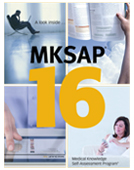
The new Medical Knowledge Self-Assessment Program® (MKSAP® 16) provides you with the most current and critical information in the core of internal medicine and its subspecialties so you can stay aware of what you need to know as a practicing physician in internal medicine today.
For more information on MKSAP 16, or to order your copy, visit http://www.acponline.org/products_services/mksap/16/
MKSAP 16 Q & A
A 23-year-old man is evaluated for a 3-day history of redness and itchiness of the right eye. He had an upper respiratory tract infection 3 days before the eye symptoms began. Each morning he has awoken with crusting over the lids. He is otherwise healthy, with no ocular trauma or recent medical problems.
On physical examination, he is afebrile, blood pressure is 122/72 mm Hg, pulse rate is 66/min, and respiration rate is 16/min. Right eye conjunctival injection is present, with some crusting at the lids. Bilateral vision is 20/20. Pupils are equally round and reactive to light.
Which of the following is the most appropriate management of this patient?
A. Cool compresses to the affected eye
B. Oral antihistamine
C. Topical antibiotics
D. Topical corticosteroids
Click here for the answer and critique.
Introducing ACP Smart Medicine

A FREE benefit of your ACP membership, ACP Smart Medicine is a new web-based, mobile-optimized clinical decision support tool developed specifically for internal medicine. Developed by ACP, it provides trusted, point-of-care recommendations for the screening, prevention, diagnosis, and treatment of hundreds of diseases and includes specific content on complementary and alternative medicine.
Integrated with content from Annals of Internal Medicine, ACP JournalWise, and ACP's clinical practice guidelines, the clinical recommendations in ACP Smart Medicine are evidence-based and rated based on the quality of the underlying evidence. Information is continually updated.
ACP Smart Medicine's concise format and layered structure make it a perfect tool to support many of your daily activities including:
Point-of- Care
ACP Smart Medicine's bulleted structure provides quick access to "key points" about each disease, diagnosis instructions, comparative drug tables, and differential diagnosis tables making it ideal for use during patient visits.
Research Resource
ACP Smart Medicine's summary of relevant supporting evidence helps you update your knowledge on topics you may encounter throughout your day.
Review Clinical Recommendations
With quick access to evidence-based recommendations and links to supporting guidelines, ACP Smart Medicine is an invaluable resource to ensure you are following the most current recommendations.
Simply log in at smartmedicine.acponline.org with your ACP membership ID today to get started. In addition, you can get one click access from your smartphone or tablet by installing a web shortcut on your device's home screen
International Meetings Update
ACP Colombia Chapter Meeting
September 12-14, 2013
The Annual Meeting of the ACP Colombia Chapter was held in conjunction with the Colombian Association of Internal Medicine (ACMI) from September 12-14, 2013 in Pasto, Colombia. There were approximately 750 attendees at the meeting from all over Colombia. Robert Jackson, MD, FACP, Governor of the Texas Southern Chapter served as the ACP Leadership Liaison and Maximo Brito, MD, FACP, served as the ACP International Ambassador.
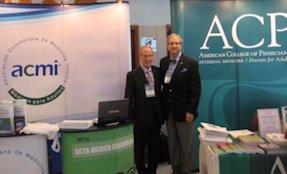 Dr. Esguerra, Colombia Chapter Governor, stands with Dr. Jackson, Texas Southern Chapter Governor and ACP Ambassador
Dr. Esguerra, Colombia Chapter Governor, stands with Dr. Jackson, Texas Southern Chapter Governor and ACP Ambassador
Dr. Jackson spoke on several topics, including "Pain in Internal Medicine" and "Improving Quality and Patient Care". Dr Brito spoke on "Diagnosis and Treatment of Viral Hepatitis" and "Caring for the HIV-Positive Patient".
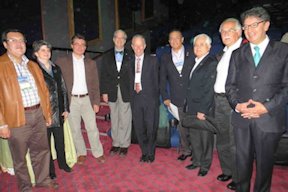 Pictured left: Dr. Alvaro Portilla, Dr. Natalia Londoño, Dr. Alejandro Gaviria, Minister of Health for Colombia, Dr. Robert Jackson, Dr. Robero Eguerra, ACP Colombia Chapter Governor, Dr. Amel Bracho, Dr. Jaime Calderon, Dr. Roberto D´Chiardi, Dr. Carlos Francisco Fernandez, President of the Colombian Association of Scientific Societies.
Pictured left: Dr. Alvaro Portilla, Dr. Natalia Londoño, Dr. Alejandro Gaviria, Minister of Health for Colombia, Dr. Robert Jackson, Dr. Robero Eguerra, ACP Colombia Chapter Governor, Dr. Amel Bracho, Dr. Jaime Calderon, Dr. Roberto D´Chiardi, Dr. Carlos Francisco Fernandez, President of the Colombian Association of Scientific Societies.
For more photos from the meeting, visit the ACP Colombia Chapter's online photo gallery.
12th Congress of the European Federation of Internal Medicine
October 2-5, 2013

The European Federation of Internal Medicine held its 12th European Congress of Internal Medicine from October 2-5, 2013 in Prague, Czech Republic. There were over 1500 attendees at the meeting. Dr. Molly Cooke, MD, FACP, ACP President, was invited to serve as the ACP International Ambassador to the meeting by Prof. Richard Ceska, MD, PhD, FACP, President of the Czech Society of Internal Medicine and President of the 2013 European Congress of Internal Medicine. Dr. Cooke spoke on "Internal Medicine and the Revolution in Health Care Delivery in the United States".
The next EFIM Congresss will be held in conjunction with the Swiss Society of General Internal Medicine's 82nd Annual Meeting on May 14-16, 2014 in Geneva, Switzerland. For more information, please visit www.escim2014.org
Annual Meeting of the Canadian Society of Internal Medicine / ACP Ontario Chapter Meeting
October 2-5, 2013
The Canadian Society of Internal Medicine held their annual meeting in conjunction with the ACP Ontario Chapter October 2-5, 2013 in Toronto, Ontario. The theme of this year's meeting was "General Internal Medicine: Leading Quality Improvement." The meeting offered a diverse program of interactive workshops, symposia, and plenary sessions that cover current topics and issues relevant to General Internists. Clinical vignettes and research presentations rounded out the program. There were approximately 600 attendees at the meeting.
Ross Feldman, MD, FACP, Governor of the ACP Ontario Chapter, presented two Laureate awards during the chapter portion of the meeting; one to Brian Haynes, MD, MACP and the other to former chapter Governor, Janet Roscoe, MD, FACP. Dr Roscoe's award cited her contributions to the ACP as well as her outreach efforts in Mongolia. Dr. Haynes's award cited his lifetime achievement in Knowledge Translation efforts including his KT role in the ACP Journal Club. Dr. Haynes also delivered this year's Governor's Lecture on "How Can Evidence-Based Health Care Become Successful".
One of the highlights of the meeting was the Canadian National Doctor's Dilemma competition. Coming through both as the chapter champion and Canadian national DD champion was the team from University of Ottawa.
ACP staff exhibited at this meeting and reported significant interest in Smart Medicine, ACP's new clinical decision support tool, and the Medical Knowledge Self Assessment Program (MKSAP).
Next year's meeting will be held October 1-4, 2014 in Calgary, Alberta.
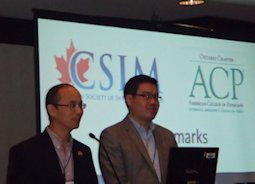 CSIM Annual Meeting Committee co-chairs Stephen Hwang, MD, FACP (at left) and Brian Wong, MD (at right).
CSIM Annual Meeting Committee co-chairs Stephen Hwang, MD, FACP (at left) and Brian Wong, MD (at right).
New International Fellows
ACP is pleased to announce the following newly elected International Fellows, who were recommended by the Credentials Committee and approved for election by the Board of Regents as of November 1, 2013. They are listed by current location and may have been credentialed through a different Chapter.
Argentina
-
Carlos E. Perandones, MD, FACP - Buenos Aires
Canada
-
Humaid Al-Shamsi, MBBS, FACP - Hamilton
- Sahar J. Iqbal, MBBS, FACP - St. John's
- Mitchell A. Levine, MD, FACP - Ancaster
-
Matthew B. Stanbrook, MD, FACP - Toronto
Bangladesh
-
S. M. Kamal, MBBS, FACP - Khulna
- Ajit Kumar Paul, MBBS, FACP - Comilla
-
Md Shahab Uddin, MBBS, FACP - Comilla Chittagong
Chile
-
Alejandro Pacheco Duran, MD, FACP - Santiago
-
Walter Passalacqua Rivanera, MD, FACP - La Reina
Colombia
-
Maria del Pilar Pena Tobar, MD, FACP - Neiva Huila
- Analinda Elizabeth Pinilla Roa, MD, FACP - Bogota
-
Eduardo Ramirez, MD, FACP - Pereira
Costa Rica
-
Jose A. Acuna-Feoli, MD, FACP - San Jose
- Carlos Alberto Araya Sr., MD, FACP - Heredia
- Carlos M. Cerdas Mena, MD, FACP - Cartago
-
Julian Pena, MD, FACP - San Jose
Japan
-
Naoki Yanagisawa, MD, FACP - Tokyo
Mexico
-
Maria Antonieta Calderon Marquez, MD, FACP - Estado de Mexico
- Ericka Carrillo Velazquez, MD, FACP - Ciudad Mexico
-
Edith Flores Hernandez, MD, FACP - Nezahualcoyotl
Panama
-
Julio C. Sandova, MD, FACP - Panama City
Qatar
-
Dora J. Stadler, MD, FACP - Doha
Thailand
-
Rajata Rajatanavin, MD, FACP - Nakhon Pathom
United Arab Emirates
-
Janan Q. Al-Khayat, MBChB, FACP - Abu Dhabi
-
Ashraf M. Elghul, MBBch, FACP - Abu Dhabi
Future Worldwide Internal Medicine Meetings
Upcoming meetings will be held in Canada and Taiwan.
A complete list of other Future Worldwide Internal Medicine Meetings is available here.
Highlights from ACP Internist and
ACP Hospitalist
ACP Internist October 2013
- Diabetic foot care begins with bare feet
Internists can head up a care team that intervenes early and often in preventing the ulcerations, pressure points and neuropathies that can progress to infection and possibly amputation.
- Anticoagulant choice for stroke won't be easy for some time
New agents improve upon warfarin, but they are expensive and lack antidotes for urgent reversal. There is no clear winner among the current options, and more are on the way.
- C. difficile difficult for outpatient physicians and patients, too
The majority of Clostridium difficile patients come from outside the hospital setting.
ACP Hospitalist October 2013
- Measuring hospitalist workload
In hospital medicine, workload cannot simply be measured by hours on the clock, but must encompass more intangible factors such as the type of work, the acuity of patients, the time of day, etc. Hospitalist programs are taking a hard look at ways to distribute workload fairly.
- Act early to avert AKI
Incidence of acute kidney injury is increasing, due in part to advances in medical care and an aging population, and hospitalists need to know how to manage it.
- Kickstarting your academic hospital medicine career
Building networks, finding mentors and staying open to new experiences and opportunities are recommended strategies.
College Corner
Chapter Excellence Award Winners
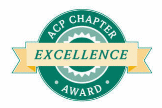 We are happy to announce that eleven international chapters are in receipt of the 2013 Chapter Excellence Award. These are the Alberta, Brazil, British Columbia, Central America, Chile, Colombia, Japan, Mexico, Ontario, Saudi Arabia and Venezuela Chapters. These chapters are in receipt of this award because they have made great strides in chapter management in numerous ways. These include such activities as formulating an effective Governor's Council and committees, communicating frequently with their membership, providing educational opportunities, recruiting and advancing members and celebrating their membership through local awards. Congratulations to these chapters on a job well done!
We are happy to announce that eleven international chapters are in receipt of the 2013 Chapter Excellence Award. These are the Alberta, Brazil, British Columbia, Central America, Chile, Colombia, Japan, Mexico, Ontario, Saudi Arabia and Venezuela Chapters. These chapters are in receipt of this award because they have made great strides in chapter management in numerous ways. These include such activities as formulating an effective Governor's Council and committees, communicating frequently with their membership, providing educational opportunities, recruiting and advancing members and celebrating their membership through local awards. Congratulations to these chapters on a job well done!
How ACP Members can Help Disaster Recovery in the Philippines
The American College of Physicians (ACP) is saddened by the plight of thousands in the Philippines who are suffering the devastating aftermath of Typhoon Haiyan. The storm's magnitude and its destruction are unprecedented. Thousands are reported dead and many more are in need of food, shelter, and healthcare. For ACP members who wish to assist in the relief effort now underway, ACP recommends supporting one or more of the organizations listed here.
MKSAP 16 Answer & Critique
Answer: A, Cool compresses to the affected eye
Educational Objective: Manage viral conjunctivitis.
Critique: The most appropriate management is the application of cool compresses to the affected eye. This patient has symptoms and signs most consistent with viral conjunctivitis. Onset is usually acute, with unilateral redness, watery discharge, itching, crusting, a diffuse foreign body sensation, and mild photophobia. This patient's preceding upper respiratory tract infection, normal vision, and unilateral eye involvement are supportive of this diagnosis. Viral conjunctivitis is managed conservatively with cool compresses. The patient should be told not to share towels or other personal items with family members and should wash his hands frequently throughout the day. He should also be warned that the infection may spread to the other eye before resolving.
Allergic conjunctivitis may be recurrent and seasonal and presents with itching, conjunctival edema, and cobblestoning under the upper lid. It usually responds to topical antihistamines, short-course topical NSAIDs (3 days maximum), and compresses. Oral antihistamines have no role in the treatment of viral conjunctivitis.
Bacterial conjunctivitis usually has a mucopurulent discharge, in contrast to the clear, watery discharge seen in viral conjunctivitis. Topical antibiotics are not efficacious for viral conjunctivitis and can be associated with adverse effects, including the development of contact dermatitis and antibiotic resistance. If a lubricant is required, non-antibacterial lubricating agents may be used.
Topical corticosteroids are not indicated despite the patient's discomfort and should rarely, if ever, be used by physicians other than ophthalmologists. If used inappropriately for herpes simplex, fungal, or bacterial conjunctivitis, topical corticosteroids can lead to corneal scarring, melting, and perforation.
Key Point: Viral conjunctivitis, characterized by acute onset and unilateral redness, watery discharge, itching, crusting, a diffuse foreign body sensation, and mild photophobia, is managed conservatively with cool compresses.
Bibliography:
Galor A, Jeng BH. Red eye for the internist: when to treat, when to refer. Clev Clin J Med. 2008;75(2):137-144. [PMID: 18290357]

